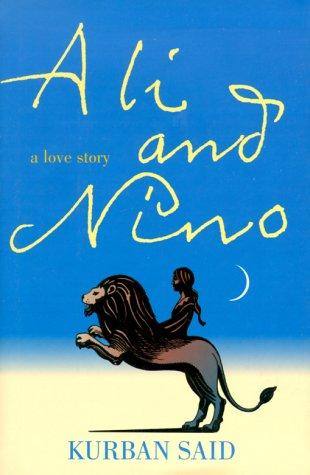At the crossroads of Europe and Asia, Christianity and Islam, the progressive West and the reactionary East, the peoples of the Caucasus lie poised between three empires and their own dreams of independence. And at the city of Baku, where the ancient and unchangeable desert meets the oil rigs of the Caspian Sea, young Ali Shirvanshir has fallen in love with Nino Kipiani, a Georgian and a Christian.
A timeless story of forbidden love, Ali and Nino is both the Romeo and Juliet of the Caucasus and the national novel of Azerbaijan. It is as much a romance as it is a story of the clash of cultures and identities in our rapidly changing modern world. Above all else, it is a beautiful and haunting tale that will leave you dreaming with your eyes open and yearning for lands that you’ve never seen.
This is, quite possibly, the most perfect book I have read all year. I picked it up in Tbilisi from another TLG volunteer on Sunday, and I finished it at a breathless sprint on Wednesday. But while the story was good, it was the writing itself that really captivated me. The simple yet surprisingly rich descriptions of the alien cultures, so dreamlike and yet so straightforward, often to the point of being shocking–here, let me give an example:
“Shamil’s Prayer!” called Iljas Beg to the musicians. Immediately a wild melody arose. Iljas Beg jumped into the middle of the hall. He drew his dagger. His feet moved in the fiery rhythm of the Caucasian Mountain Dance. The blade glittered in his hand. Nino danced up to him. Her feet looked like small strange toys. Shamil’s Mystery began.
We clapped to the rhythm of the music. Nino was the bride to be abducted…Iljas put the dagger between his teeth. Like a bird of prey, his arms outstretched, he circled round the girl. Nino’s feet flew whirling round the hall, her supple arms depicting all stages of fear, despair, and submission. In her left hand she held a handkerchief. Her whole body trembled. Only the coins on her cap lay quietly on her forehead, and that was the correct way–this is the most difficult part of the dance. No one but a Georgian girl can do such fantastically quick turns and not let even one coin on her cap tinkle.
Iljas raced after her. Without stopping, he chased her round and round. The wide gestures of his arms became more and more dominating, Nino’s defensive movements more and more tender. At last she stopped, like a deer overtaken by the hunter. Closer and closer Iljas Beg circled. Nino’s eyes were soft and humble. Her hands trembled. A wild, short howl from the music, and she opened her left hand. The handkerchief fluttered to the floor. And suddenly Iljas Beg’s dagger flew onto the little piece of silk and nailed it to the floor. The symbolic dance was finished.
By the way, did I mention that before the dance, I gave Iljas Beg my dagger and took his? It was my blade that pierced Nino’s handkerchief. It is best to be on the safe side, for a wise rule teaches: “Before you trust your camel to Allah’s protection, tie it fast onto your fence.”
The whole novel is like that, and it’s awesome. The narrative passes from one description to the next, and you feel almost like you’re caught up in a dream, reading a fairy tale. It’s only the railroads and oil rigs, the mention of Paris and London and Moscow, that make you step back and realize that this isn’t a fantasy novel, but something set in our modern world.
And yet, even though it feels like a fairy tale, the author gets a surprising number of things right. Georgians really do have some of the most beautiful eyes of any people. I haven’t yet been inside the sulfur baths at Tbilisi, but everything else in Said’s description of that city is more or less correct. Kakhetian wine really is the most famous within Georgia, and probably the whole Caucasus as well.
The most gratifying thing is to see how it all comes together. Even though the descriptions sometimes feel as lavish as a Persian rug, no word is wasted–there is a good reason for every tangent, solidly grounded in the story. There are plenty of red herrings and Chekhov’s guns to make the plot twists thoroughly satisfying. But never at any point did I feel compelled to try and predict what would come next. I enjoyed the story so much, I was barely aware of the fact that I was reading.
Whether you’re looking for an exotic romance, or you just want to explore a culture thoroughly alien from your own, Ali and Nino is a book you will thoroughly enjoy. If, like me, you have any interest in the Caucasus, you probably won’t be able to stop coming back to it. And if you’re just looking for a good read, I can think of few books that are more perfect than this one.

wow, thanks for this review! I’m putting this to the top of my list 🙂
No problem! I hope you like it as much as I did.
Can you bring home the copy you read? Or was it electronic?
I can bring it home, if you’d like.